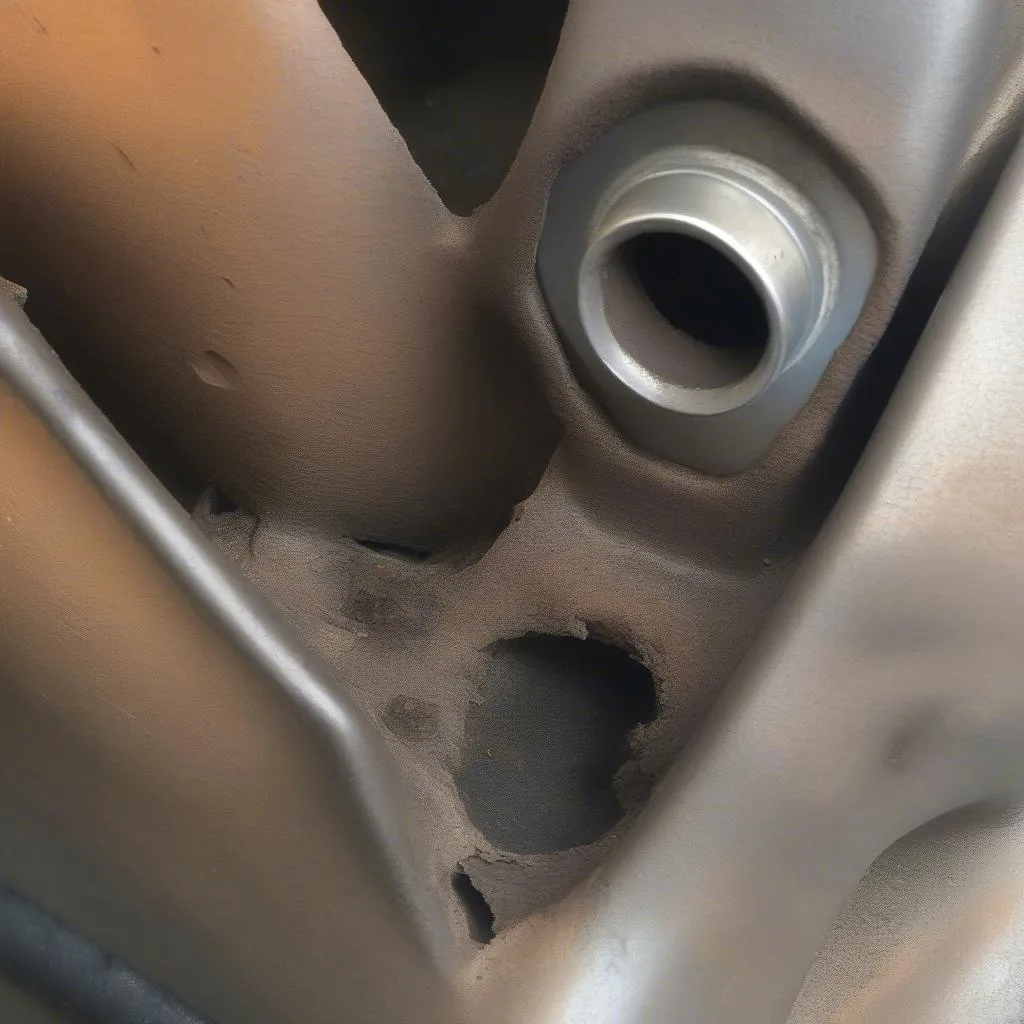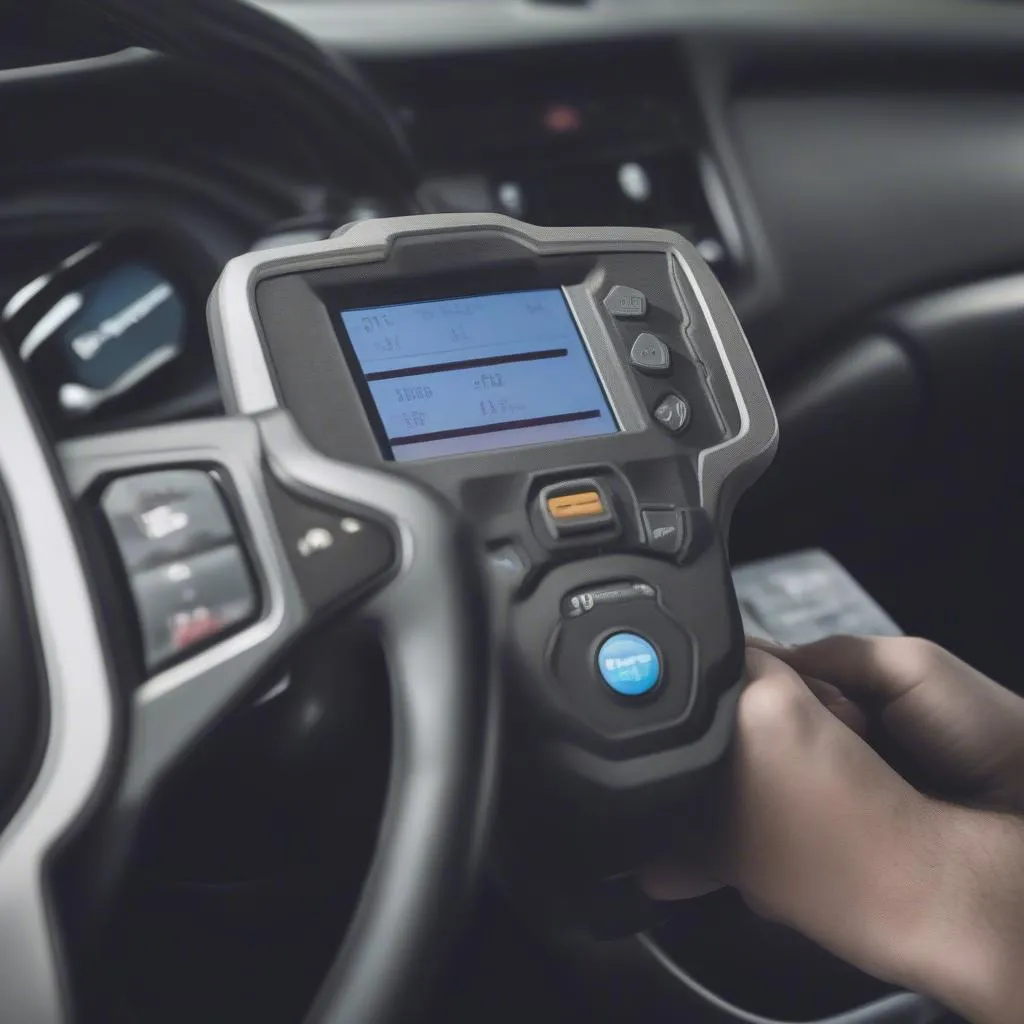Imagine yourself cruising down the highway in your Chevy, enjoying the open road. Suddenly, the “Check Engine” light illuminates on your dashboard, sending a wave of anxiety through you. You pull over, check your engine, but find nothing out of the ordinary. Then you pull out your OBD2 scanner and it reads “P0430.” What does this code mean, and what should you do?
This article will explore the meaning of the Chevy Obd Code P0430, providing insights into its causes, symptoms, and potential solutions. We’ll also discuss common questions related to this code, helping you understand this issue better and take appropriate actions.
What Does OBD Code P0430 Mean?
The OBD code P0430 signifies a “Catalyst System Efficiency Below Threshold (Bank 2).” This means the engine control unit (ECU) has detected a problem with the catalytic converter on Bank 2.
From a Mechanic’s Perspective
As a mechanic, encountering a P0430 code means we need to investigate the catalytic converter’s efficiency. This might involve inspecting the converter itself for damage, analyzing the exhaust gases, and checking the oxygen sensor readings.
From a Technical Perspective
Bank 2 refers to the side of the engine that doesn’t contain cylinder #1. The catalytic converter is designed to convert harmful emissions into less harmful ones. When the ECU detects inefficiency in the converter, it triggers the P0430 code.
From an Economic Perspective
A faulty catalytic converter can lead to decreased fuel efficiency and potentially higher emissions, impacting your wallet and the environment.
Understanding the Causes of P0430 Code
Several factors can contribute to this code:
- Faulty Catalytic Converter: The most common cause is a damaged or failing catalytic converter. Over time, the internal components can become clogged or damaged due to excessive heat, exposure to harsh conditions, or even a buildup of pollutants.
- Oxygen Sensor Malfunction: Oxygen sensors play a crucial role in monitoring exhaust gas composition. If an oxygen sensor fails or becomes fouled, it can misinterpret data and trigger the P0430 code.
- Fuel System Issues: A rich air-fuel mixture, caused by problems like a faulty fuel injector or a clogged air filter, can lead to excess unburned hydrocarbons entering the catalytic converter, causing damage and inefficiency.
- Exhaust Leak: Leaks in the exhaust system can disrupt the flow of exhaust gases, affecting the catalytic converter’s performance and potentially leading to a P0430 code.
- Wiring or Electrical Problems: Faulty wiring or electrical components related to the catalytic converter or oxygen sensors can also trigger the code.
Common Symptoms of P0430 Code
Besides the “Check Engine” light, you might also experience the following:
- Reduced Engine Power: A faulty catalytic converter can hinder exhaust flow, leading to reduced engine performance.
- Rough Idle: An inefficient catalytic converter can cause engine misfires and erratic idle.
- Increased Fuel Consumption: A damaged catalytic converter can disrupt the fuel-air mixture, resulting in lower fuel efficiency.
- Exhaust Odor: The exhaust might smell unusual or pungent.
Diagnosing and Solving the P0430 Code
Step 1: Verify the Code
First, use an OBD2 scanner to confirm the P0430 code. Some scanners can provide additional information, such as freeze frame data, which can help pinpoint the cause.
Step 2: Inspect the Catalytic Converter
Visually inspect the catalytic converter for any signs of damage, such as cracks, holes, or excessive buildup.
 Damaged Catalytic Converter
Damaged Catalytic Converter
Step 3: Check the Oxygen Sensors
Examine the oxygen sensors for any signs of damage, corrosion, or fouling. Measure their resistance with a multimeter and ensure they are within the manufacturer’s specifications.
Step 4: Assess the Fuel System
Inspect fuel injectors for proper operation, check the air filter for blockage, and verify fuel pressure readings.
Step 5: Inspect the Exhaust System
Look for leaks in the exhaust system, especially near the catalytic converter.
Step 6: Check Wiring and Electrical Components
Inspect wiring for damage, corrosion, or loose connections.
Commonly Asked Questions About Chevy Obd Code P0430:
- Can I drive my Chevy with a P0430 code? While you can drive your Chevy with the code, it’s important to address the issue soon. A faulty catalytic converter can affect engine performance, fuel efficiency, and emissions.
- How much does it cost to replace a catalytic converter? The cost of replacing a catalytic converter varies depending on the model of your Chevy, the type of converter, and the labor charges in your area. It’s a good idea to get quotes from multiple mechanics before making a decision.
- Can I clean a catalytic converter? While there are cleaning solutions available, their effectiveness is limited and not always recommended.
- Can I drive with a faulty catalytic converter? It’s not advisable to drive with a faulty catalytic converter for extended periods as it can lead to further damage to the engine and potentially affect other components.
- Can a P0430 code be caused by a bad spark plug? While unlikely, a bad spark plug can contribute to a rich air-fuel mixture, potentially damaging the catalytic converter and triggering the P0430 code.
Is There a DIY Solution?
While some minor repairs related to wiring or sensors might be doable, replacing the catalytic converter or tackling more complex issues is best left to experienced mechanics. It’s important to remember that proper diagnosis and repair are crucial to ensure your Chevy’s health and safety.
Next Steps:
- Contact a qualified mechanic: If you’re experiencing the P0430 code, it’s advisable to consult a qualified mechanic for proper diagnosis and repair.
- Find a trusted mechanic: Look for a certified mechanic with experience working on Chevy vehicles and a good reputation.
- Obtain multiple quotes: Get quotes from different mechanics to compare prices and services before deciding.
- Maintain your vehicle regularly: Regular maintenance, such as oil changes and tune-ups, can help prevent issues and ensure your Chevy runs smoothly.
Conclusion
The P0430 code is a common concern for Chevy owners. Understanding its causes, symptoms, and potential solutions can help you address the issue promptly. Remember to consult a professional mechanic for a thorough diagnosis and repair, ensuring your Chevy remains reliable and safe.
Want to delve deeper into your car’s diagnostics? We can help! Contact us via WhatsApp at +84767531508 and we’ll connect you with our team of experienced technicians to assist you with any questions or concerns you may have.
 OBD2 Scanner
OBD2 Scanner